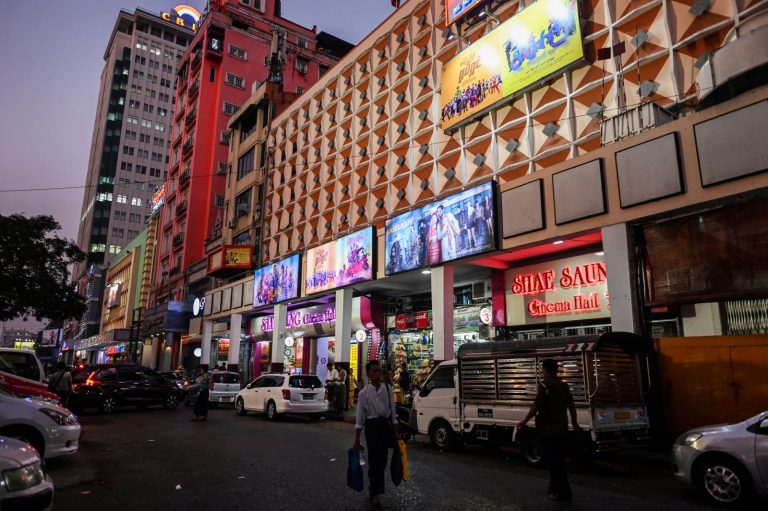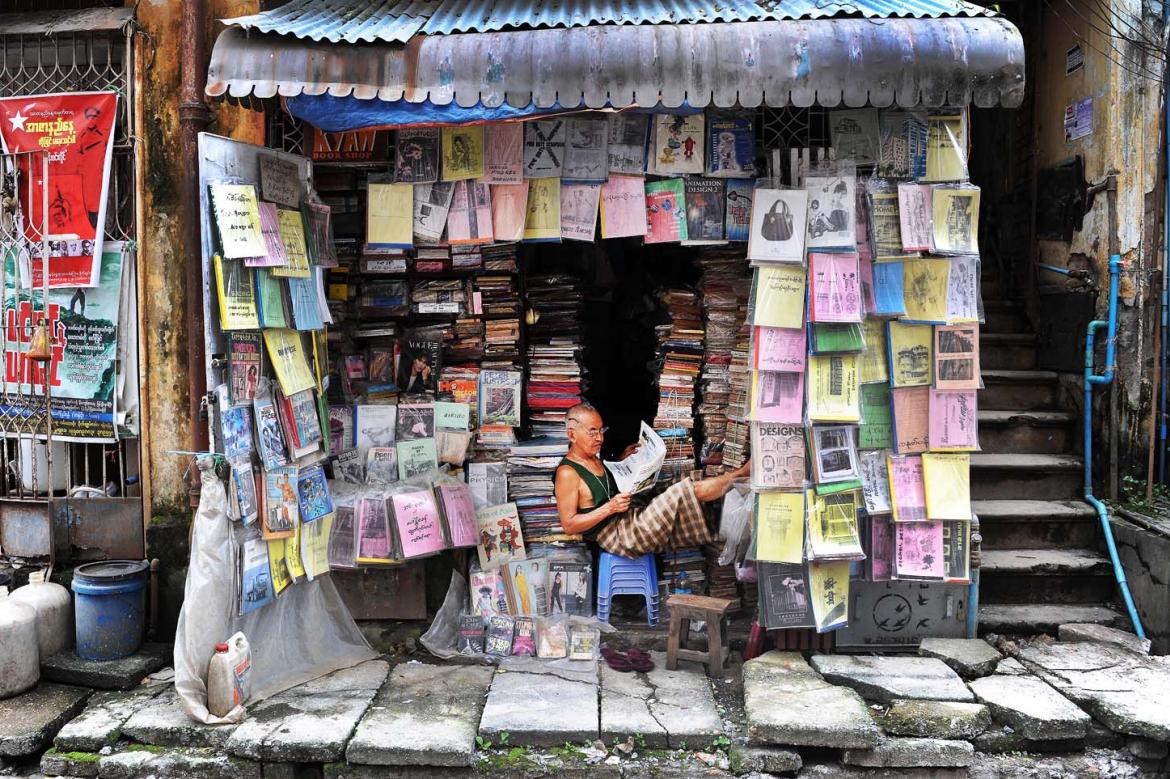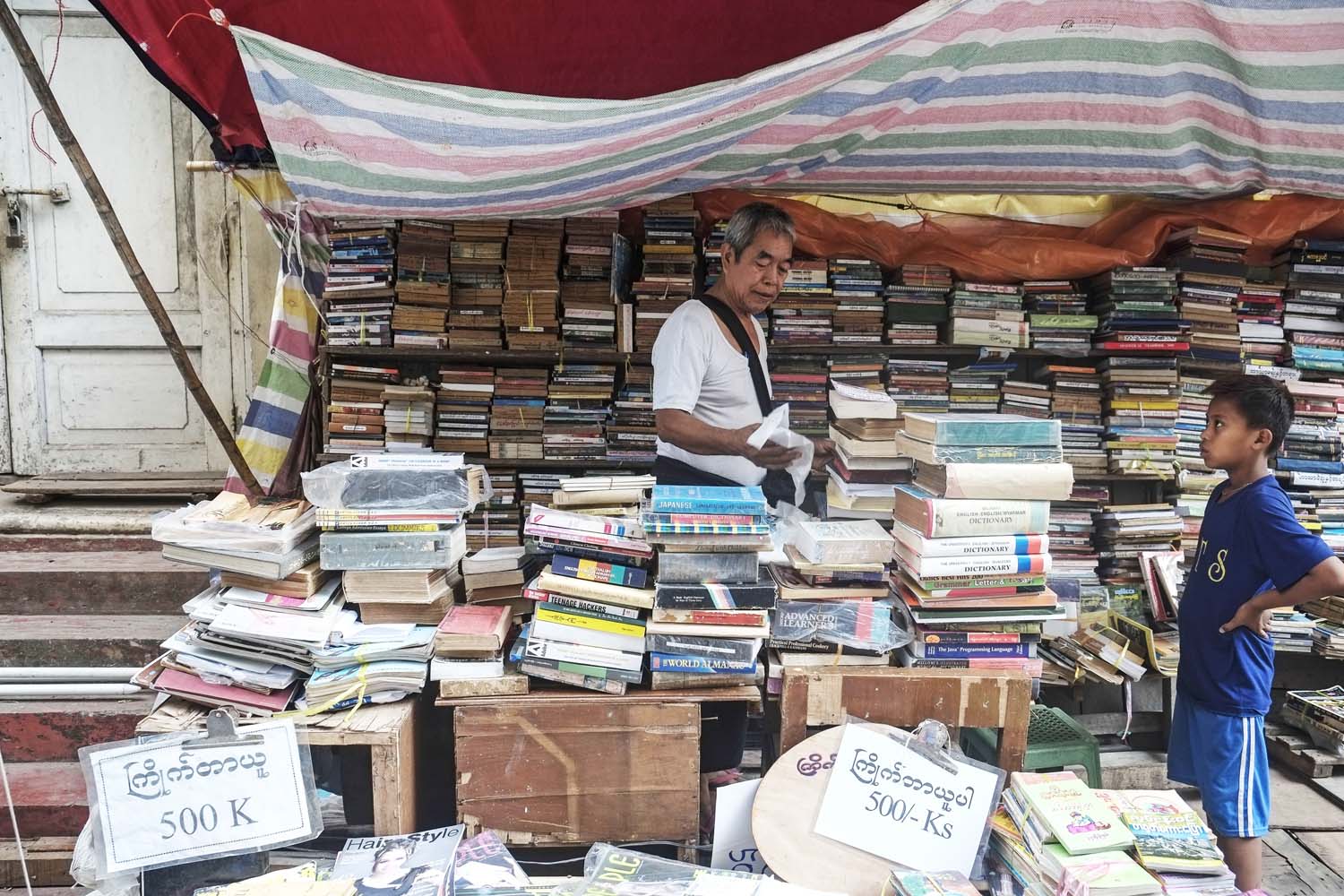A student activist, education reformer and poet discuss the books that most influenced their lives.
By AMY DOFFEGNIES | FRONTIER
WITH social media constantly at our fingertips, literature may seem in danger of being left behind. But the stories of three extraordinary individuals are a testament to the power of the printed word. For Phyoe Phyoe Aung, Saw Myo Min Thu and Than Toe Aung, books provided a portal to alternative possibilities for their country and their lives. They tell Frontier about how their favourite reads shaped their thinking and why books remain indispensable even in an internet age.
‘This book led me to the political field as a very first step’
While she finds it difficult to choose just one book among all those that have influenced her, Phyoe Phyoe Aung, a renowned student activist and the face of countrywide protests for educational reform in 2015, chose Better to Stand and Die by Chinese writers Chang Lin and Shu Yang as “the book that was able to change my childhood thoughts and dreams”.
Translated into Burmese by well-known writer, journalist and former political prisoner Ludu Sein Win and published in 1965, the book was banned by the former military government.
“The book is about a Chinese girl, Chao i-man. She refused every single rule for Chinese women not only in her home but also in her school; she fought oppressive laws for women and participated in the Chinese revolution. She was arrested, violently interrogated by the Japanese Kempeitai [secret police] and killed because she didn’t say anything except, ‘Shall revolution win,’ as her last words,” said Phyoe Phyoe Aung.
Support more independent journalism like this. Sign up to be a Frontier member.
“This book led me to the political field as a very first step when I was 11,” explained the former general secretary of the All Burma Federation of Student Unions, who in 2015 won the Citizen of Burma Award for her leadership and dedication to education reform.

Phyoe Phyoe Aung, the former general secretary of the All Burma Federation of Student Unions. (AFP)
Better to Stand and Die not only inspired Phyoe Phyoe Aung; it helped her to understand the difficult life choices of her father, an activist who was arrested in 1988 when she was just nine months old. “After reading that book I started to understand why my father chose to go prison and started becoming interested in my country’s situation. Most of the children of political prisoners misunderstand their parents because families were broken up by government arrest.”
Phyoe Phyoe Aung read Better to Stand and Die covertly after discovering it in a box of books that belonged to her father. “I found that book when I was 11 and I read it without doing anything else until the end. I cried again and again after reading it and my mum noticed that I had read my father’s book secretly.”
Asked about the ways in which the book influenced her, Phyoe Phyoe Aung said, “It brought me a lot of encouragement when I was investigated by intelligence and when I was in prison too. Chao i-man reminded me how to stand for what I believe in. She never gave up although she lost her family, she had a very big heart for all of the people of China, sacrificing her family for larger China.”
The book’s impact was such that Phyoe Phyoe Aung took on the name “Chaw Ei”, after the main character, when she started to participate in underground work for the ABFSU in 2007. When she was released from prison in 2012, Ludu Sein Win gave Phyoe Phyoe Aung a signed copy of the book.
“When I received the second edition copy of the book, the translator wrote my name as ‘Chaw Ei’ in the front page,” she recalled proudly.
‘His ideas influenced my very decision to return to my country’
Another prominent advocate for educational reform, Saw Myo Min Thu, the executive director of Thabyay Education Foundation, identified Nelson Mandela’s Long Walk to Freedom as one of the most influential reads of his life. “It would not be wrong to say that his book and his ideas influenced my very decision to return to my country, Myanmar, after having lived abroad for two decades.”
Saw Myo Min Thu was introduced to Mandela’s writings by a former college professor in the United States. The essay An Ideal for Which I am Prepared to Die was particularly powerful, he said.
“In this he spoke of democratic principle, racial equality and justice as ideas for which he hoped to live but if need be, give his life as well. His exceptional endurance of long years in prison and his ability to answer ‘I feel stronger’ to a journalist upon his release, continue to inspire me until today.
“Knowing his experience in the struggle for justice and racial equality for African people, I feel I personally have not done much for the people of Myanmar. I probably do not have enough courage to say ‘I am prepared to die’ for justice but I feel I must at least have the courage to speak and act for justice.”
Saw Myo Min Thu described how Mandela’s words prompted serious thinking, “I was, for the first time, compelled to think carefully about what is ‘legal’ and what is ‘just’ and that what is ‘legal’ in a certain context may not always be ‘just’. I learned to cherish ‘justice’ over ‘rule of law’ if and when the two ideas compete.
“Of course, there are other books such as Intellectual Exile by Edward Said and Resistance, Rebellion, and Death by Albert Camus that influence my thinking very much,” said Saw Myo Min Thu.
But it is Mandela’s reflections on education as “the great engine of personal development” that inspire his everyday work with youth at Thabyay, a leading provider of higher education.
‘The way I see life after reading his books has changed vividly’
Than Toe Aung, writer, poet and the force spearheading Yangon’s awakening to slam poetry chose Vietnamese author Kien Nguyen’s The Unwanted: A Memoir of Childhood as the book that most impacted him.
In his own work, Than Toe Aung writes about books as a kind of therapy, about love across religious divides and about racism. His poem “It Starts With You” – inspired by growing up as a Muslim in Yangon – went viral on social media. He came across The Unwanted as a 20-year-old university student determined to advance his language skills by reading English language books at the American Center.

Writer and poet Than Toe Aung. (Nyein Su Wai Kyaw Soe | Frontier)
Than Toe Aung described how the book gave him an intimate understanding of the life and suffering of another. “This book was addictive. It is about the author’s childhood during the Vietnam War, his life turned upside down – losing his loved ones and being mistreated by trusted relatives, full of tragedies, it made me realise how hard life can be for some people.
Than Toe Aung was “deeply inspired” by the author’s perseverance through the harshness of reality. “When I think about giving up, I remember Kien Nguyen and his life and keep myself back on track.”
‘It will never be the same as reading a book’
Asked about the ongoing appeal of books, Than Toe Aung said they hold a singular power. “No matter if people have more access to information, it will never be the same as reading a book, walking through somebody’s life in a book and soaking oneself in another world that only books can create.”
On this question, Phyoe Phyoe Aung noted the ease of access to the internet and the preoccupation with news updates and technology among youth. “They are far from literature for aesthetic enjoyment. But these kinds of books can give us enormous encouragement for every kind of struggle in our lives. I still need to read many books for my heart not just for my brain.”
Phyoe Phyoe Aung also highlighted the ongoing relevance of the issues raised in her chosen book – the struggle for political change and gender equality. “The book I introduced you to is about a revolutionary girl who struggles for women’s equality in her family but also her society. Still we face gender inequality.’
Saw Myo Min Thu spoke passionately on the subject of youth. “We, as a country, especially in times of critical transition, now need to nurture a new generation of citizens who are not only critical and creative but also kind and compassionate.”
In cultivating such qualities, literature can play a deep role, providing us with unique opportunities to see into the lives of others, he said.
“I believe that within each and every one of us exists a mysterious capacity that makes it possible for us to feel the suffering that is neither our own nor of our concern as though it were our own – that is what we call compassion. It exists within us but it has to be discovered.”
In the social media age, this journey of discovery is something that literature still offers all of us.
TOP PHOTO: Saw Myo Min Thu at his office at the Thabyay Education Foundation in Yangon’s Hlaing Township. (Theint Mon Soe — J | Frontier)







